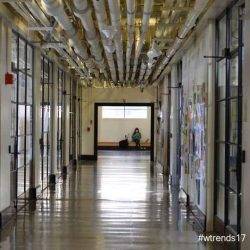November 10, 2017
Best practice in flexible working and gender diversity honoured at awards presentation
Workingmums.co.uk has announced the winners of its eighth annual Top Employer Awards, celebrating the leading companies in gender diversity and flexible working. The Awards were presented at a ceremony at London’s Soho Hotel on 7th November where the keynote speaker was Ann Francke, CEO of the Chartered Management Institute. Winner of the Overall Top Employer Award was Lloyds Banking Group. The judges felt it was ‘a beacon for other employers with regard to its agile hiring programme which was a root and branch attempt to normalise different ways of working from recruitment onwards. It was a strong performer across all the categories and had made a major step forward in embedding a flexible culture.’








 Businesses are concerned about the pace of commitment to improving the UK’s infrastructure, and a record number of firms are dissatisfied with the state of infrastructure in their region. With the UK currently ranking 27th in the world for the quality of its infrastructure, nearly all (96 percent) of businesses in the 2017 CBI/AECOM Infrastructure Survey see infrastructure as important (of which 55 percent view it as critical) to the Government’s agenda. From the Clean Growth Strategy and the £500 billion infrastructure pipeline to its decision to build a new runway at Heathrow and press ahead with the A303 tunnel, the Government has made clear its commitment to British infrastructure. However, only one in five firms is satisfied with the pace of delivery (20 percent) and almost three quarters (74 percent) doubt infrastructure will improve over this Parliament. This lack of confidence is attributed primarily to policy inconsistency (+94 percent of firms) & political risk (+86 percent). The digital sector is the exception, however, where 59 percent of firms are confident of improvements.
Businesses are concerned about the pace of commitment to improving the UK’s infrastructure, and a record number of firms are dissatisfied with the state of infrastructure in their region. With the UK currently ranking 27th in the world for the quality of its infrastructure, nearly all (96 percent) of businesses in the 2017 CBI/AECOM Infrastructure Survey see infrastructure as important (of which 55 percent view it as critical) to the Government’s agenda. From the Clean Growth Strategy and the £500 billion infrastructure pipeline to its decision to build a new runway at Heathrow and press ahead with the A303 tunnel, the Government has made clear its commitment to British infrastructure. However, only one in five firms is satisfied with the pace of delivery (20 percent) and almost three quarters (74 percent) doubt infrastructure will improve over this Parliament. This lack of confidence is attributed primarily to policy inconsistency (+94 percent of firms) & political risk (+86 percent). The digital sector is the exception, however, where 59 percent of firms are confident of improvements.




 Those working within the built environment are already in the change business, was the view of Neil Usher of
Those working within the built environment are already in the change business, was the view of Neil Usher of 











October 25, 2017
Frederick Taylor was a man of his time not a whipping boy for ours
by Mark Eltringham • Comment, News, Workplace, Workplace design
(more…)